Unit 10 You're supposed to shake hands 单元测试(含答案解析)
文档属性
| 名称 | Unit 10 You're supposed to shake hands 单元测试(含答案解析) | 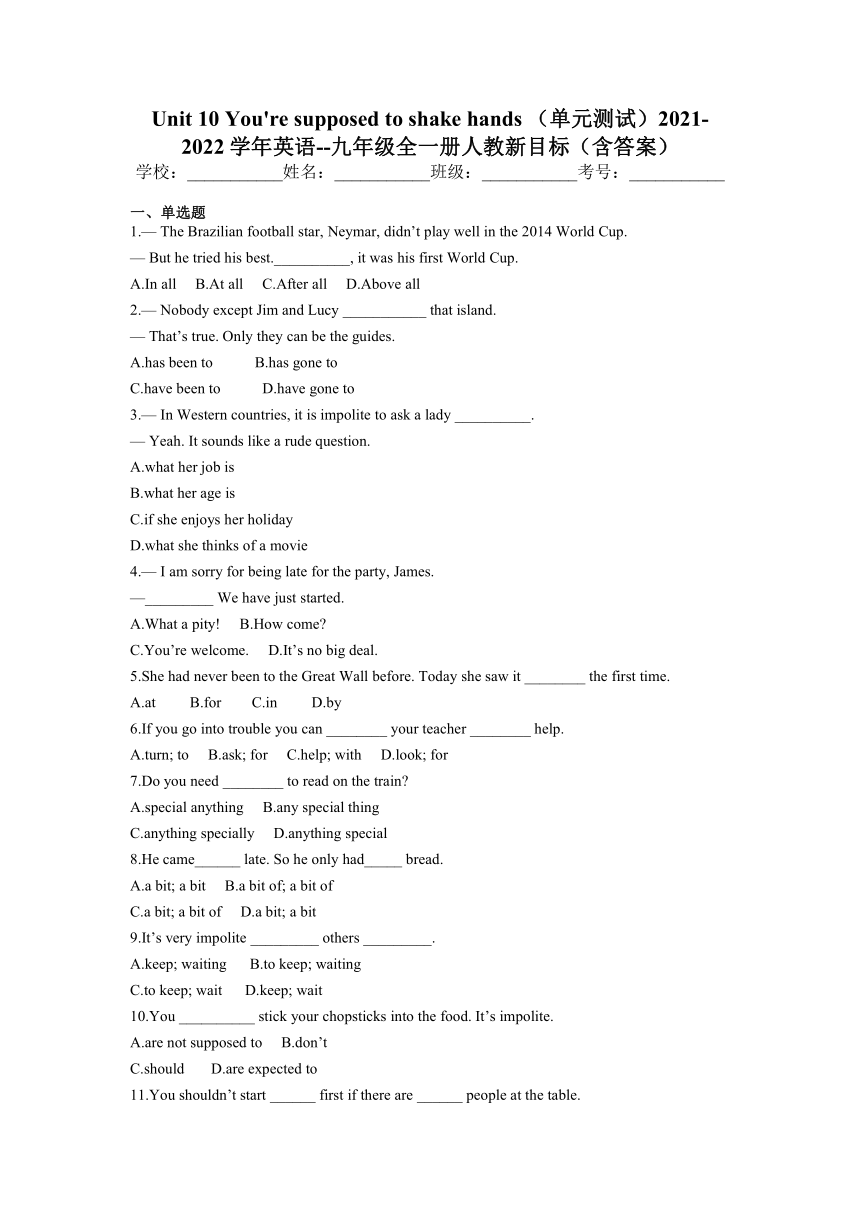 | |
| 格式 | zip | ||
| 文件大小 | 33.4KB | ||
| 资源类型 | 教案 | ||
| 版本资源 | 人教新目标(Go for it)版 | ||
| 科目 | 英语 | ||
| 更新时间 | 2021-09-11 13:22:10 | ||
图片预览

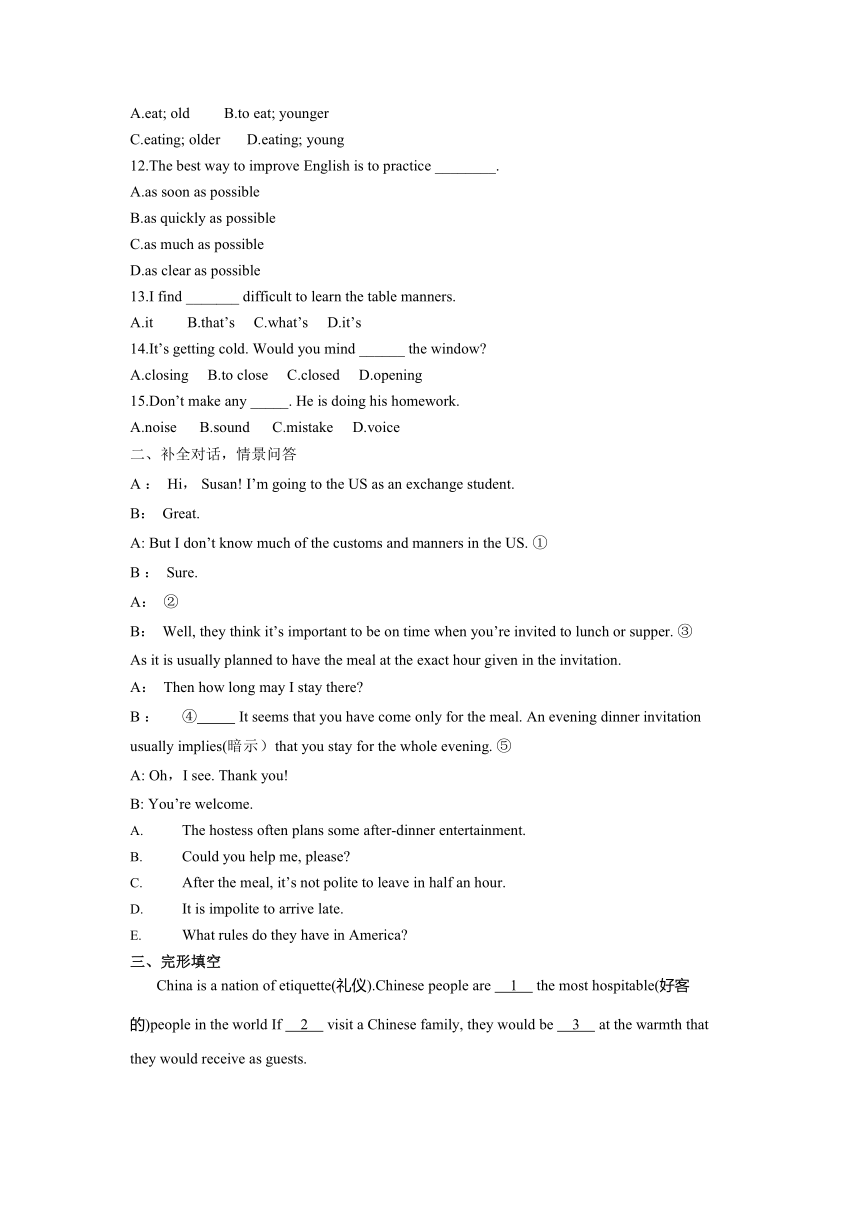
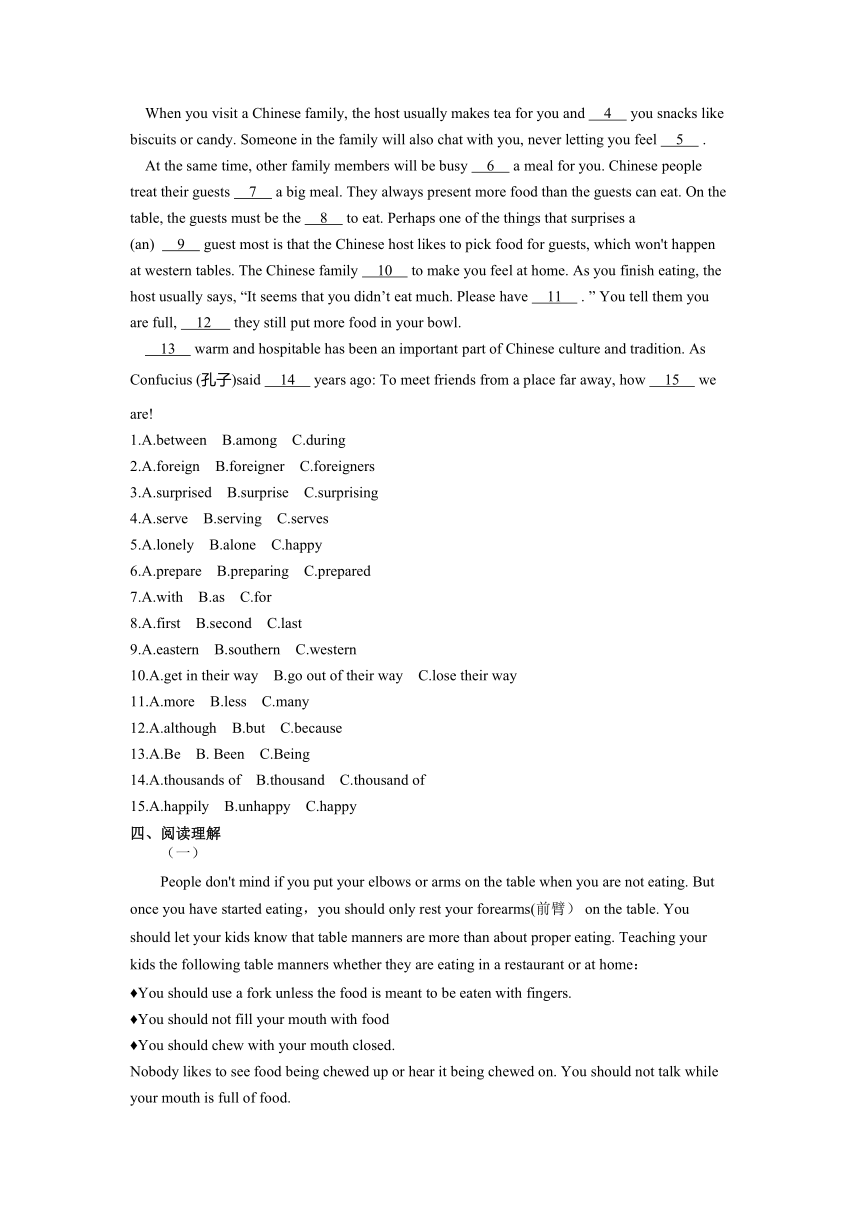
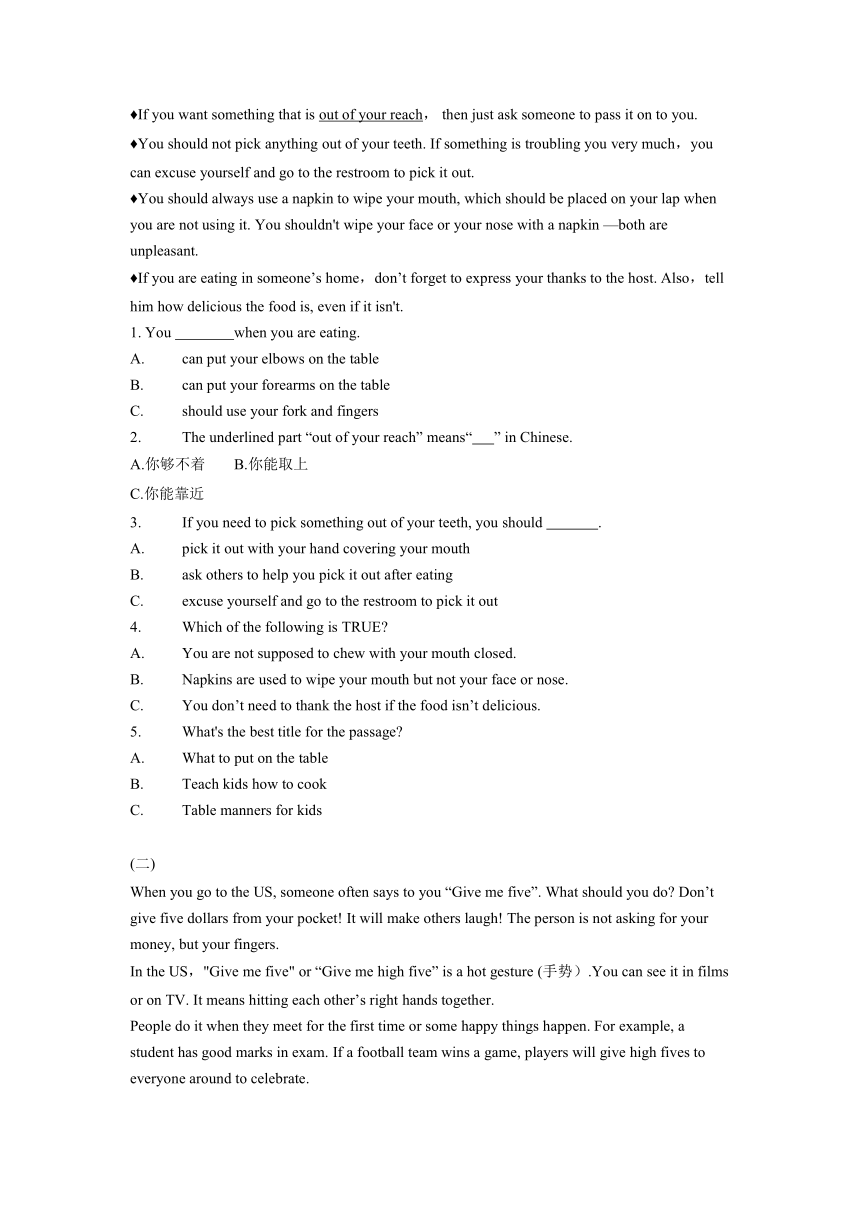
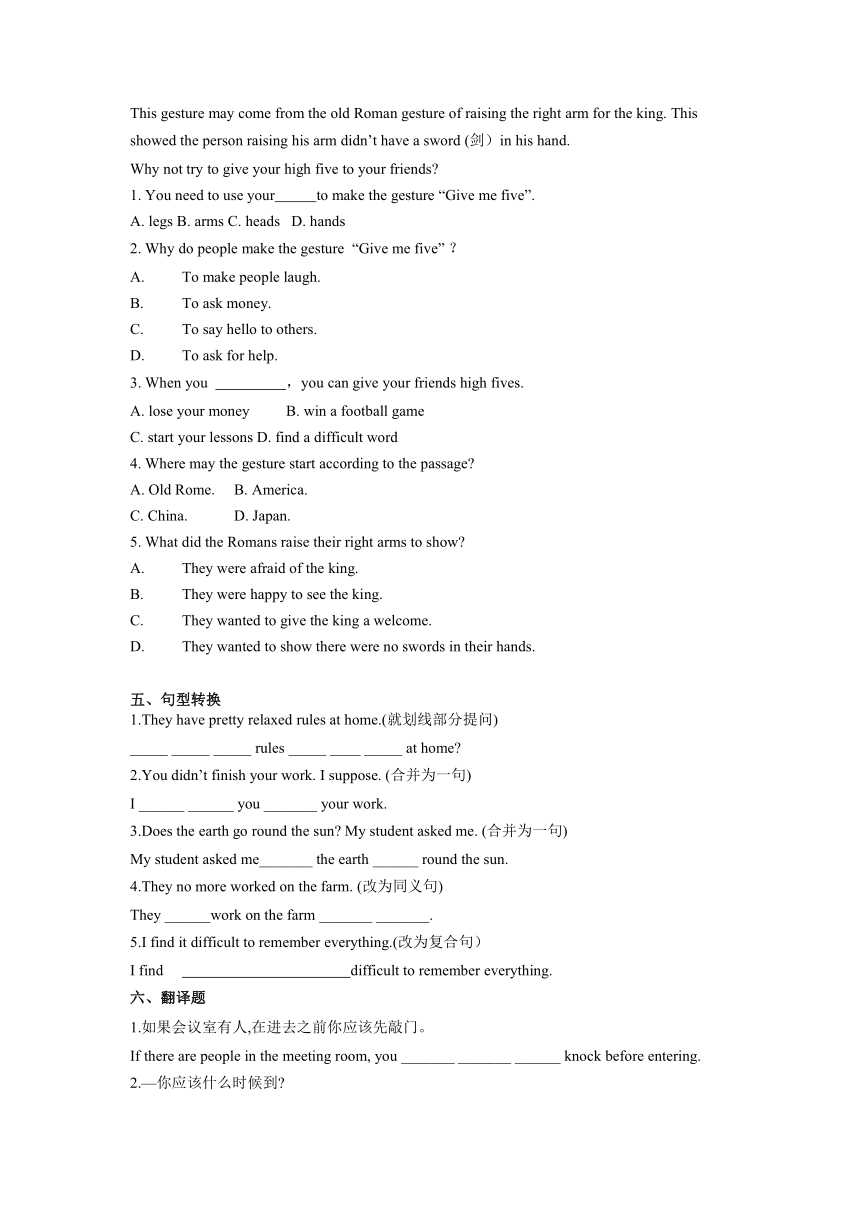
文档简介
Unit
10
You're
supposed
to
shake
hands
(单元测试)2021-2022学年英语--九年级全一册人教新目标(含答案)
学校:___________姓名:___________班级:___________考号:___________
一、单选题
1.—
The
Brazilian
football
star,
Neymar,
didn’t
play
well
in
the
2014
World
Cup.
—
But
he
tried
his
best.__________,
it
was
his
first
World
Cup.
A.In
all?????B.At
all?????C.After
all?????D.Above
all
2.—
Nobody
except
Jim
and
Lucy
___________?that
island.
—
That’s
true.
Only
they
can
be
the
guides.
A.has
been
to???????????B.has
gone
to
C.have
been
to???????????D.have
gone
to
3.—
In
Western
countries,
it
is
impolite
to
ask
a
lady
__________.
—
Yeah.
It
sounds
like
a
rude
question.
A.what
her
job
is
B.what
her
age
is
C.if
she
enjoys
her
holiday
D.what
she
thinks
of
a
movie
4.—
I
am
sorry
for
being
late
for
the
party,
James.
—_________
We
have
just
started.
A.What
a
pity!?????B.How
come?
C.You’re
welcome.?????D.It’s
no
big
deal.
5.She
had
never
been
to
the
Great
Wall
before.
Today
she
saw
it
________
the
first
time.
A.at?????????B.for????????C.in?????????D.by
6.If
you
go
into
trouble
you
can
________
your
teacher
________
help.
A.turn;
to?????B.ask;
for?????C.help;
with?????D.look;
for
7.Do
you
need
________
to
read
on
the
train?
A.special
anything?????B.any
special
thing
C.anything
specially?????D.anything
special
8.He
came______
late.
So
he
only
had_____
bread.
A.a
bit;
a
bit?????B.a
bit
of;
a
bit
of
C.a
bit;
a
bit
of?????D.a
bit;
a
bit
9.It’s
very
impolite
_________
others
_________.
A.keep;
waiting??????B.to
keep;
waiting
C.to
keep;
wait??????D.keep;
wait
10.You
__________
stick
your
chopsticks
into
the
food.
It’s
impolite.
A.are
not
supposed
to?????B.don’t
C.should???????D.are
expected
to
11.You
shouldn’t
start
______
first
if
there
are
______
people
at
the
table.
A.eat;
old?????????B.to
eat;
younger
C.eating;
older???????D.eating;
young
12.The
best
way
to
improve
English
is
to
practice
________.
A.as
soon
as
possible
B.as
quickly
as
possible
C.as
much
as
possible
D.as
clear
as
possible
13.I
find
_______
difficult
to
learn
the
table
manners.
A.it?????????B.that’s?????C.what’s?????D.it’s
14.It’s
getting
cold.
Would
you
mind
______
the
window?
A.closing?????B.to
close?????C.closed?????D.opening
15.Don’t
make
any
_____.
He
is
doing
his
homework.
A.noise??????B.sound??????C.mistake?????D.voice
二、补全对话,情景问答
A
:
Hi,Susan!
I’m
going
to
the
US
as
an
exchange
student.
B:
Great.
A:
But
I
don’t
know
much
of
the
customs
and
manners
in
the
US.
①
B
:
Sure.
A:
②
B:
Well,
they
think
it’s
important
to
be
on
time
when
you’re
invited
to
lunch
or
supper.
③
As
it
is
usually
planned
to
have
the
meal
at
the
exact
hour
given
in
the
invitation.
A:
Then
how
long
may
I
stay
there?
B
:
④
It
seems
that
you
have
come
only
for
the
meal.
An
evening
dinner
invitation
usually
implies(暗示)that
you
stay
for
the
whole
evening.
⑤
A:
Oh,I
see.
Thank
you!
B:
You’re
welcome.
The
hostess
often
plans
some
after-dinner
entertainment.
Could
you
help
me,
please?
After
the
meal,
it’s
not
polite
to
leave
in
half
an
hour.
It
is
impolite
to
arrive
late.
What
rules
do
they
have
in
America?
三、完形填空
??
China
is
a
nation
of
etiquette(礼仪).Chinese
people
are????
1???
?the
most
hospitable(好客的)people
in
the
world
If????
2???
?visit
a
Chinese
family,
they
would
be????
3???
?at
the
warmth
that
they
would
receive
as
guests.
???
When
you
visit
a
Chinese
family,
the
host
usually
makes
tea
for
you
and????
4???
?you
snacks
like
biscuits
or
candy.
Someone
in
the
family
will
also
chat
with
you,
never
letting
you
feel????
5???
?.
???
At
the
same
time,
other
family
members
will
be
busy????
6???
?a
meal
for
you.
Chinese
people
treat
their
guests????
7???
?a
big
meal.
They
always
present
more
food
than
the
guests
can
eat.
On
the
table,
the
guests
must
be
the????
8???
?to
eat.
Perhaps
one
of
the
things
that
surprises
a
(an)?????
9???
?guest
most
is
that
the
Chinese
host
likes
to
pick
food
for
guests,
which
won't
happen
at
western
tables.
The
Chinese
family????
10???
?to
make
you
feel
at
home.
As
you
finish
eating,
the
host
usually
says,
“It
seems
that
you
didn’t
eat
much.
Please
have????
11???
?.
”
You
tell
them
you
are
full,????
12
???
?they
still
put
more
food
in
your
bowl.
???????
13???
?warm
and
hospitable
has
been
an
important
part
of
Chinese
culture
and
tradition.
As
Confucius
(孔子)said????
14???
?years
ago:
To
meet
friends
from
a
place
far
away,
how????
15???
?we
are!
1.A.between????B.among????C.during
2.A.foreign????B.foreigner????C.foreigners
3.A.surprised????B.surprise????C.surprising
4.A.serve????B.serving????C.serves
5.A.lonely????B.alone????C.happy
6.A.prepare????B.preparing????C.prepared
7.A.with????B.as????C.for
8.A.first????B.second????C.last
9.A.eastern????B.southern????C.western
10.A.get
in
their
way????B.go
out
of
their
way????C.lose
their
way
11.A.more????B.less????C.many
12.A.although????B.but????C.because
13.A.Be????B.
Been????C.Being
14.A.thousands
of????B.thousand????C.thousand
of
15.A.happily????B.unhappy????C.happy
四、阅读理解
(一)
People
don't
mind
if
you
put
your
elbows
or
arms
on
the
table
when
you
are
not
eating.
But
once
you
have
started
eating,you
should
only
rest
your
forearms(前臂)
on
the
table.
You
should
let
your
kids
know
that
table
manners
are
more
than
about
proper
eating.
Teaching
your
kids
the
following
table
manners
whether
they
are
eating
in
a
restaurant
or
at
home:
?You
should
use
a
fork
unless
the
food
is
meant
to
be
eaten
with
fingers.
?You
should
not
fill
your
mouth
with
food
?You
should
chew
with
your
mouth
closed.
Nobody
likes
to
see
food
being
chewed
up
or
hear
it
being
chewed
on.
You
should
not
talk
while
your
mouth
is
full
of
food.
?If
you
want
something
that
is
out
of
your
reach,
then
just
ask
someone
to
pass
it
on
to
you.
?You
should
not
pick
anything
out
of
your
teeth.
If
something
is
troubling
you
very
much,you
can
excuse
yourself
and
go
to
the
restroom
to
pick
it
out.
?You
should
always
use
a
napkin
to
wipe
your
mouth,
which
should
be
placed
on
your
lap
when
you
are
not
using
it.
You
shouldn't
wipe
your
face
or
your
nose
with
a
napkin
—both
are
unpleasant.
?If
you
are
eating
in
someone’s
home,don’t
forget
to
express
your
thanks
to
the
host.
Also,tell
him
how
delicious
the
food
is,
even
if
it
isn't.
1.
You
when
you
are
eating.
A.
can
put
your
elbows
on
the
table
B.
can
put
your
forearms
on
the
table
C.
should
use
your
fork
and
fingers
2.
The
underlined
part
“out
of
your
reach”
means“
”
in
Chinese.
A.你够不着
B.你能取上
C.你能靠近
3.
If
you
need
to
pick
something
out
of
your
teeth,
you
should
.
A.
pick
it
out
with
your
hand
covering
your
mouth
B.
ask
others
to
help
you
pick
it
out
after
eating
C.
excuse
yourself
and
go
to
the
restroom
to
pick
it
out
4.
Which
of
the
following
is
TRUE?
A.
You
are
not
supposed
to
chew
with
your
mouth
closed.
B.
Napkins
are
used
to
wipe
your
mouth
but
not
your
face
or
nose.
C.
You
don’t
need
to
thank
the
host
if
the
food
isn’t
delicious.
5.
What's
the
best
title
for
the
passage?
A.
What
to
put
on
the
table
B.
Teach
kids
how
to
cook
C.
Table
manners
for
kids
(二)
When
you
go
to
the
US,
someone
often
says
to
you
“Give
me
five”.
What
should
you
do?
Don’t
give
five
dollars
from
your
pocket!
It
will
make
others
laugh!
The
person
is
not
asking
for
your
money,
but
your
fingers.
In
the
US,"Give
me
five"
or
“Give
me
high
five”
is
a
hot
gesture
(手势).You
can
see
it
in
films
or
on
TV.
It
means
hitting
each
other’s
right
hands
together.
People
do
it
when
they
meet
for
the
first
time
or
some
happy
things
happen.
For
example,
a
student
has
good
marks
in
exam.
If
a
football
team
wins
a
game,
players
will
give
high
fives
to
everyone
around
to
celebrate.
This
gesture
may
come
from
the
old
Roman
gesture
of
raising
the
right
arm
for
the
king.
This
showed
the
person
raising
his
arm
didn’t
have
a
sword
(剑)in
his
hand.
Why
not
try
to
give
your
high
five
to
your
friends?
1.
You
need
to
use
your
to
make
the
gesture
“Give
me
five”.
A.
legs
B.
arms
C.
heads
D.
hands
2.
Why
do
people
make
the
gesture
“Give
me
five”
?
A.
To
make
people
laugh.
B.
To
ask
money.
C.
To
say
hello
to
others.
D.
To
ask
for
help.
3.
When
you
,you
can
give
your
friends
high
fives.
A.
lose
your
money
B.
win
a
football
game
C.
start
your
lessons
D.
find
a
difficult
word
4.
Where
may
the
gesture
start
according
to
the
passage?
A.
Old
Rome.
B.
America.
C.
China.
D.
Japan.
5.
What
did
the
Romans
raise
their
right
arms
to
show?
A.
They
were
afraid
of
the
king.
B.
They
were
happy
to
see
the
king.
C.
They
wanted
to
give
the
king
a
welcome.
D.
They
wanted
to
show
there
were
no
swords
in
their
hands.
五、句型转换
1.They
have
pretty
relaxed
rules
at
home.(就划线部分提问)
_____
_____
_____
rules
_____
____
_____
at
home?
2.You
didn’t
finish
your
work.
I
suppose.
(合并为一句)
I
______
______
you
_______
your
work.
3.Does
the
earth
go
round
the
sun?
My
student
asked
me.
(合并为一句)
My
student
asked
me_______
the
earth
______
round
the
sun.
4.They
no
more
worked
on
the
farm.
(改为同义句)
They
______work
on
the
farm
_______
_______.
5.I
find
it
difficult
to
remember
everything.(改为复合句)
I
find
difficult
to
remember
everything.
六、翻译题
1.如果会议室有人,在进去之前你应该先敲门。
If
there
are
people
in
the
meeting
room,
you
_______
_______
______
knock
before
entering.
2.—你应该什么时候到???????????
—我应该在七点钟到。
—When
were
you_________
___________
_________?
—I
________
__________
__________
arrive
at
7:00.
3.尽可能多的学习那些风俗习惯是有帮助的。
It
is
helpful
__________
________
________
many
of
these
customs.
4.在很多东欧国家,握手前你应该摘掉手套的。
In
many
eastern
European
countries,
you
_________
________
__________
take
off
your
gloves
before
shaking
hands.
5.关于美国的餐桌礼仪你是怎么看的?
What
do
you
think
of
the
__________
__________
in
America.
七、填空题
从方框中选择恰当的介词、副词填空。?
?up,?of,?in,?without,?at,?about,?after,?by???
1.They?often?drop?__________?their?friends’?homes?at?weekends.
2.In?Switzerland,?we?never?visit?a?friend’s?house?__________?calling?first.?
3.We?need?to?know?__________?table?manners?when?we?visit?Japan.
4.First?__________?all,?you?should?finish?your?homework.
5.He?picked?__________?his?hat?and?went?out.
6.Tom?arrives?__________?Beijing?on?time.
7.He?was?pointing?his?finger?__________?me.
8.Don’t?blame?(责骂)him?anymore.?He?is?a?child,?__________?all.
八、写作题
假如你是李军,你在美国的笔友Torn要来中国玩,他来信询问你关于中国的餐桌礼仪方面的事情。
请你给他回一封信,介绍一下中国的餐桌礼仪。
要求:
1.80词左右,开头和结尾已给出,不计入总词数;
2.不能使用真实姓名和地名。
Dear
Tom,
I’m
going
to
tell
you
something
about
the
table
manners
in
China.
______________________________________________________________________________________________________________________________________________________________________________________________________________________________________________________________________________________________________________________________________________________________________________________________________________________________________________________________________________________________________________________________
Best
wishes,
Li
Jun
参考答案
一、
1.答案:C
2.答案:A
3.答案:B
4.答案:C
5.答案:B
6.答案:B
7.答案:D
8.答案:C
9.答案:C
10.答案:A
11.答案:C
12.答案:C
13.答案:A
14.答案:A
15.答案:A
二、
答案:BEDCA
三、
答案:1.B;
2.C;
3.A;
4.C;
5.A;
6.B;
7.A;
8.A;
9.C;
10.B;
11.A;
12.B;
13.C;
14.A;
15.C
B
between表示两者之间;among表示三者或者三者
以上之间;during
“在……期间"。此处表示中国人是
世界上最好客的人之一,故选B。
2.
C根据谓语动词visit可知,主语应为名词复数形式,
故选C。
3.
A
surprised形容词,意为"惊讶的",修饰人;surprise
名词,意为"惊奇";surprising形容词,意为"令人吃惊的",修饰物。分析句意可知,外国人会对这种热情感
到惊讶,由主语they可知选A。
4.
C分析句子结构,and连接两个并列动词作谓语,前
面makes用了第三人称单数形式,故选C。
5.
A
lonely"寂寞的";alone"独自";happy"开心的"。有
人跟你聊天,你就不会感到寂寞。故选A。
6.
B句意:同时,其他家庭成员忙着为你准备饭菜。短
语be
busy
doing
sth.意为"忙于做某事"。故选B0
7.
A短语treat
sb.
with
sth.意为"用某物招待某人"。
故选A。
8.
A联系常识可知,在中国,席间客人先吃。故选A。
9.
C
根据下文
which
won’t
happen
at
western
tables
可
知,中国主人喜欢给客人夹菜的情况在西方餐桌上不
会发生,这让西方客人感到吃惊。故选C。
10.
B
get
in
their
way"妨碍他们";go
out
of
their
way"特地;格外努力":lose
their
way“迷路”。根据上文主人
为客人沏茶、招待客人吃点心、家庭成员陪客人聊天、
准备大餐等行为可知,中国家庭费尽心思(go
out
of
their
way)让客人感觉像在家里一样。故选B。
11.
A主人感觉客人吃得不多,所以让客人再多吃点。
故选A。
12.
B句意:你告诉他们你吃饱了,
他们仍然往你碗里放更多的食物。although
"虽然";but"但是";
because1"因为"。分析句意可知,前后两句构成转折关系。故选B。
13.
C句意:热情好客已成为中国文化和传统中的重要部
分。动名词短语作主语。故选C。
14.
A句意:正如孔子数千年前所说。thousands
of固定
短语,意为"数以千计的"。故选A。
15.
C
be动词are后跟形容词,所以排除A;句意为"有朋
自远方来,不亦乐乎?
"。故选C。
四、
(一)答案:
BACBC
1.
B细节理解题。根据第一段的内容"But
once
you
have
started
eating,
you
should
only
rest
your
forearms
on
the
table.
"可知,在你就餐的时候,你只能
把前臂放在桌子上。故选B。
2.
A词义猜测题。句意:如果你想要一些够不着的东西,那就请他人递给你。故选A。
3.
C细节理解题。根据第六段的内容"You
should
not
pick
anything
out
of
your
teeth.
If
something
is
troubling
you
very
much,
you
can
excuse
yourself
and
go
to
the
restroom
to
pick
it
out."可知,你如果需要剔
牙,可以找个借口,然后去洗手间把它弄出来。故
选C。
4.
B细节理解题。根据倒数第二段的内容"You
should
always
use
a
napkin
to
wipe
your
mouth,
which
should
be
placed
on
your
lap
when
you
are
not
using
it.
You
shouldn't
wipe
your
face
or
your
nose
with
a
napkin—
both
are
unpleasant."可知,你应该用餐巾擦嘴,不应该用餐巾擦你的脸或鼻子。故选B。
5.
C主旨大意题。本篇文章介绍的是应该教给孩子们
的一些餐桌礼仪。故选C。
(二)答案:DCBAD
1.D
细节理解题。根据文中第二段第三句"It
means
hitting
each
other’s
right
hands
together"可知选
D。
2.
C细节理解题。根据文中第三段第一句"People
do
it
when
they
meet
for
the
first
time
or
some
happy
things
happen"可知,当人们初次见面或者有开心的事情发生时会击掌。故选C。
3.
B推理判断题。根据文中第三段第一句"People
do
it
when
they
meet
for
the
first
time
or
some
happy
things
happen"可知,四个选项中只有B符合开心的事情。故选B。
4.
A细节理解题。根据文中第四段第一句
“This
gesture
may
come
from
the
old
Roman
gesture
of
raising
the
right
arm
for
the
king”
可知选A。
5.
D细节理解题。根据文中第四段第二句
“This
showed
the
person
raising
his
arm
didn’t
have
a
sword(剑)in
his
hand”可知选
D。
五、
1.答案:What
kind
of
do
they
have
2.答案:did’t
suppose
finished
3.答案:that
go
4.答案:didn’t
any
more
5.答案:that
it
is
六、
1.答案:are
supposed
to
2.答案:supposed
to
arrive
was
supposed
to
3.答案:to
learn
about
4.答案:are
supposed
to
5.答案:table
manners
七、
答案:1.by;
2.without;
3.about;
4.of;
5.up;
6.in;
7.with;
8.after
八、答案:Dear
Tom,
I’m
going
to
tell
you
something
about
the
table
manners
in
China.
You
shouldn’t
point
at
anyone
with
your
chopsticks.
You
can
make
a
toast
at
the
beginning
of
the
dinner.
You
can’t
stick
your
chopsticks
into
your
food.
And
it’s
rude
to
speak
loudly
at
table.
I
think
it's
good
to
wipe
your
mouth
with
the
napkin
after
you
take
a
drink.
And
it’s
polite
to
thank
the
hostess
for
the
food.
I
hope
the
above
points
can
help
you,
and
I
hope
you
will
have
a
great
time
in
China.
Best
wishes,
Li
Jun
10
You're
supposed
to
shake
hands
(单元测试)2021-2022学年英语--九年级全一册人教新目标(含答案)
学校:___________姓名:___________班级:___________考号:___________
一、单选题
1.—
The
Brazilian
football
star,
Neymar,
didn’t
play
well
in
the
2014
World
Cup.
—
But
he
tried
his
best.__________,
it
was
his
first
World
Cup.
A.In
all?????B.At
all?????C.After
all?????D.Above
all
2.—
Nobody
except
Jim
and
Lucy
___________?that
island.
—
That’s
true.
Only
they
can
be
the
guides.
A.has
been
to???????????B.has
gone
to
C.have
been
to???????????D.have
gone
to
3.—
In
Western
countries,
it
is
impolite
to
ask
a
lady
__________.
—
Yeah.
It
sounds
like
a
rude
question.
A.what
her
job
is
B.what
her
age
is
C.if
she
enjoys
her
holiday
D.what
she
thinks
of
a
movie
4.—
I
am
sorry
for
being
late
for
the
party,
James.
—_________
We
have
just
started.
A.What
a
pity!?????B.How
come?
C.You’re
welcome.?????D.It’s
no
big
deal.
5.She
had
never
been
to
the
Great
Wall
before.
Today
she
saw
it
________
the
first
time.
A.at?????????B.for????????C.in?????????D.by
6.If
you
go
into
trouble
you
can
________
your
teacher
________
help.
A.turn;
to?????B.ask;
for?????C.help;
with?????D.look;
for
7.Do
you
need
________
to
read
on
the
train?
A.special
anything?????B.any
special
thing
C.anything
specially?????D.anything
special
8.He
came______
late.
So
he
only
had_____
bread.
A.a
bit;
a
bit?????B.a
bit
of;
a
bit
of
C.a
bit;
a
bit
of?????D.a
bit;
a
bit
9.It’s
very
impolite
_________
others
_________.
A.keep;
waiting??????B.to
keep;
waiting
C.to
keep;
wait??????D.keep;
wait
10.You
__________
stick
your
chopsticks
into
the
food.
It’s
impolite.
A.are
not
supposed
to?????B.don’t
C.should???????D.are
expected
to
11.You
shouldn’t
start
______
first
if
there
are
______
people
at
the
table.
A.eat;
old?????????B.to
eat;
younger
C.eating;
older???????D.eating;
young
12.The
best
way
to
improve
English
is
to
practice
________.
A.as
soon
as
possible
B.as
quickly
as
possible
C.as
much
as
possible
D.as
clear
as
possible
13.I
find
_______
difficult
to
learn
the
table
manners.
A.it?????????B.that’s?????C.what’s?????D.it’s
14.It’s
getting
cold.
Would
you
mind
______
the
window?
A.closing?????B.to
close?????C.closed?????D.opening
15.Don’t
make
any
_____.
He
is
doing
his
homework.
A.noise??????B.sound??????C.mistake?????D.voice
二、补全对话,情景问答
A
:
Hi,Susan!
I’m
going
to
the
US
as
an
exchange
student.
B:
Great.
A:
But
I
don’t
know
much
of
the
customs
and
manners
in
the
US.
①
B
:
Sure.
A:
②
B:
Well,
they
think
it’s
important
to
be
on
time
when
you’re
invited
to
lunch
or
supper.
③
As
it
is
usually
planned
to
have
the
meal
at
the
exact
hour
given
in
the
invitation.
A:
Then
how
long
may
I
stay
there?
B
:
④
It
seems
that
you
have
come
only
for
the
meal.
An
evening
dinner
invitation
usually
implies(暗示)that
you
stay
for
the
whole
evening.
⑤
A:
Oh,I
see.
Thank
you!
B:
You’re
welcome.
The
hostess
often
plans
some
after-dinner
entertainment.
Could
you
help
me,
please?
After
the
meal,
it’s
not
polite
to
leave
in
half
an
hour.
It
is
impolite
to
arrive
late.
What
rules
do
they
have
in
America?
三、完形填空
??
China
is
a
nation
of
etiquette(礼仪).Chinese
people
are????
1???
?the
most
hospitable(好客的)people
in
the
world
If????
2???
?visit
a
Chinese
family,
they
would
be????
3???
?at
the
warmth
that
they
would
receive
as
guests.
???
When
you
visit
a
Chinese
family,
the
host
usually
makes
tea
for
you
and????
4???
?you
snacks
like
biscuits
or
candy.
Someone
in
the
family
will
also
chat
with
you,
never
letting
you
feel????
5???
?.
???
At
the
same
time,
other
family
members
will
be
busy????
6???
?a
meal
for
you.
Chinese
people
treat
their
guests????
7???
?a
big
meal.
They
always
present
more
food
than
the
guests
can
eat.
On
the
table,
the
guests
must
be
the????
8???
?to
eat.
Perhaps
one
of
the
things
that
surprises
a
(an)?????
9???
?guest
most
is
that
the
Chinese
host
likes
to
pick
food
for
guests,
which
won't
happen
at
western
tables.
The
Chinese
family????
10???
?to
make
you
feel
at
home.
As
you
finish
eating,
the
host
usually
says,
“It
seems
that
you
didn’t
eat
much.
Please
have????
11???
?.
”
You
tell
them
you
are
full,????
12
???
?they
still
put
more
food
in
your
bowl.
???????
13???
?warm
and
hospitable
has
been
an
important
part
of
Chinese
culture
and
tradition.
As
Confucius
(孔子)said????
14???
?years
ago:
To
meet
friends
from
a
place
far
away,
how????
15???
?we
are!
1.A.between????B.among????C.during
2.A.foreign????B.foreigner????C.foreigners
3.A.surprised????B.surprise????C.surprising
4.A.serve????B.serving????C.serves
5.A.lonely????B.alone????C.happy
6.A.prepare????B.preparing????C.prepared
7.A.with????B.as????C.for
8.A.first????B.second????C.last
9.A.eastern????B.southern????C.western
10.A.get
in
their
way????B.go
out
of
their
way????C.lose
their
way
11.A.more????B.less????C.many
12.A.although????B.but????C.because
13.A.Be????B.
Been????C.Being
14.A.thousands
of????B.thousand????C.thousand
of
15.A.happily????B.unhappy????C.happy
四、阅读理解
(一)
People
don't
mind
if
you
put
your
elbows
or
arms
on
the
table
when
you
are
not
eating.
But
once
you
have
started
eating,you
should
only
rest
your
forearms(前臂)
on
the
table.
You
should
let
your
kids
know
that
table
manners
are
more
than
about
proper
eating.
Teaching
your
kids
the
following
table
manners
whether
they
are
eating
in
a
restaurant
or
at
home:
?You
should
use
a
fork
unless
the
food
is
meant
to
be
eaten
with
fingers.
?You
should
not
fill
your
mouth
with
food
?You
should
chew
with
your
mouth
closed.
Nobody
likes
to
see
food
being
chewed
up
or
hear
it
being
chewed
on.
You
should
not
talk
while
your
mouth
is
full
of
food.
?If
you
want
something
that
is
out
of
your
reach,
then
just
ask
someone
to
pass
it
on
to
you.
?You
should
not
pick
anything
out
of
your
teeth.
If
something
is
troubling
you
very
much,you
can
excuse
yourself
and
go
to
the
restroom
to
pick
it
out.
?You
should
always
use
a
napkin
to
wipe
your
mouth,
which
should
be
placed
on
your
lap
when
you
are
not
using
it.
You
shouldn't
wipe
your
face
or
your
nose
with
a
napkin
—both
are
unpleasant.
?If
you
are
eating
in
someone’s
home,don’t
forget
to
express
your
thanks
to
the
host.
Also,tell
him
how
delicious
the
food
is,
even
if
it
isn't.
1.
You
when
you
are
eating.
A.
can
put
your
elbows
on
the
table
B.
can
put
your
forearms
on
the
table
C.
should
use
your
fork
and
fingers
2.
The
underlined
part
“out
of
your
reach”
means“
”
in
Chinese.
A.你够不着
B.你能取上
C.你能靠近
3.
If
you
need
to
pick
something
out
of
your
teeth,
you
should
.
A.
pick
it
out
with
your
hand
covering
your
mouth
B.
ask
others
to
help
you
pick
it
out
after
eating
C.
excuse
yourself
and
go
to
the
restroom
to
pick
it
out
4.
Which
of
the
following
is
TRUE?
A.
You
are
not
supposed
to
chew
with
your
mouth
closed.
B.
Napkins
are
used
to
wipe
your
mouth
but
not
your
face
or
nose.
C.
You
don’t
need
to
thank
the
host
if
the
food
isn’t
delicious.
5.
What's
the
best
title
for
the
passage?
A.
What
to
put
on
the
table
B.
Teach
kids
how
to
cook
C.
Table
manners
for
kids
(二)
When
you
go
to
the
US,
someone
often
says
to
you
“Give
me
five”.
What
should
you
do?
Don’t
give
five
dollars
from
your
pocket!
It
will
make
others
laugh!
The
person
is
not
asking
for
your
money,
but
your
fingers.
In
the
US,"Give
me
five"
or
“Give
me
high
five”
is
a
hot
gesture
(手势).You
can
see
it
in
films
or
on
TV.
It
means
hitting
each
other’s
right
hands
together.
People
do
it
when
they
meet
for
the
first
time
or
some
happy
things
happen.
For
example,
a
student
has
good
marks
in
exam.
If
a
football
team
wins
a
game,
players
will
give
high
fives
to
everyone
around
to
celebrate.
This
gesture
may
come
from
the
old
Roman
gesture
of
raising
the
right
arm
for
the
king.
This
showed
the
person
raising
his
arm
didn’t
have
a
sword
(剑)in
his
hand.
Why
not
try
to
give
your
high
five
to
your
friends?
1.
You
need
to
use
your
to
make
the
gesture
“Give
me
five”.
A.
legs
B.
arms
C.
heads
D.
hands
2.
Why
do
people
make
the
gesture
“Give
me
five”
?
A.
To
make
people
laugh.
B.
To
ask
money.
C.
To
say
hello
to
others.
D.
To
ask
for
help.
3.
When
you
,you
can
give
your
friends
high
fives.
A.
lose
your
money
B.
win
a
football
game
C.
start
your
lessons
D.
find
a
difficult
word
4.
Where
may
the
gesture
start
according
to
the
passage?
A.
Old
Rome.
B.
America.
C.
China.
D.
Japan.
5.
What
did
the
Romans
raise
their
right
arms
to
show?
A.
They
were
afraid
of
the
king.
B.
They
were
happy
to
see
the
king.
C.
They
wanted
to
give
the
king
a
welcome.
D.
They
wanted
to
show
there
were
no
swords
in
their
hands.
五、句型转换
1.They
have
pretty
relaxed
rules
at
home.(就划线部分提问)
_____
_____
_____
rules
_____
____
_____
at
home?
2.You
didn’t
finish
your
work.
I
suppose.
(合并为一句)
I
______
______
you
_______
your
work.
3.Does
the
earth
go
round
the
sun?
My
student
asked
me.
(合并为一句)
My
student
asked
me_______
the
earth
______
round
the
sun.
4.They
no
more
worked
on
the
farm.
(改为同义句)
They
______work
on
the
farm
_______
_______.
5.I
find
it
difficult
to
remember
everything.(改为复合句)
I
find
difficult
to
remember
everything.
六、翻译题
1.如果会议室有人,在进去之前你应该先敲门。
If
there
are
people
in
the
meeting
room,
you
_______
_______
______
knock
before
entering.
2.—你应该什么时候到???????????
—我应该在七点钟到。
—When
were
you_________
___________
_________?
—I
________
__________
__________
arrive
at
7:00.
3.尽可能多的学习那些风俗习惯是有帮助的。
It
is
helpful
__________
________
________
many
of
these
customs.
4.在很多东欧国家,握手前你应该摘掉手套的。
In
many
eastern
European
countries,
you
_________
________
__________
take
off
your
gloves
before
shaking
hands.
5.关于美国的餐桌礼仪你是怎么看的?
What
do
you
think
of
the
__________
__________
in
America.
七、填空题
从方框中选择恰当的介词、副词填空。?
?up,?of,?in,?without,?at,?about,?after,?by???
1.They?often?drop?__________?their?friends’?homes?at?weekends.
2.In?Switzerland,?we?never?visit?a?friend’s?house?__________?calling?first.?
3.We?need?to?know?__________?table?manners?when?we?visit?Japan.
4.First?__________?all,?you?should?finish?your?homework.
5.He?picked?__________?his?hat?and?went?out.
6.Tom?arrives?__________?Beijing?on?time.
7.He?was?pointing?his?finger?__________?me.
8.Don’t?blame?(责骂)him?anymore.?He?is?a?child,?__________?all.
八、写作题
假如你是李军,你在美国的笔友Torn要来中国玩,他来信询问你关于中国的餐桌礼仪方面的事情。
请你给他回一封信,介绍一下中国的餐桌礼仪。
要求:
1.80词左右,开头和结尾已给出,不计入总词数;
2.不能使用真实姓名和地名。
Dear
Tom,
I’m
going
to
tell
you
something
about
the
table
manners
in
China.
______________________________________________________________________________________________________________________________________________________________________________________________________________________________________________________________________________________________________________________________________________________________________________________________________________________________________________________________________________________________________________________________
Best
wishes,
Li
Jun
参考答案
一、
1.答案:C
2.答案:A
3.答案:B
4.答案:C
5.答案:B
6.答案:B
7.答案:D
8.答案:C
9.答案:C
10.答案:A
11.答案:C
12.答案:C
13.答案:A
14.答案:A
15.答案:A
二、
答案:BEDCA
三、
答案:1.B;
2.C;
3.A;
4.C;
5.A;
6.B;
7.A;
8.A;
9.C;
10.B;
11.A;
12.B;
13.C;
14.A;
15.C
B
between表示两者之间;among表示三者或者三者
以上之间;during
“在……期间"。此处表示中国人是
世界上最好客的人之一,故选B。
2.
C根据谓语动词visit可知,主语应为名词复数形式,
故选C。
3.
A
surprised形容词,意为"惊讶的",修饰人;surprise
名词,意为"惊奇";surprising形容词,意为"令人吃惊的",修饰物。分析句意可知,外国人会对这种热情感
到惊讶,由主语they可知选A。
4.
C分析句子结构,and连接两个并列动词作谓语,前
面makes用了第三人称单数形式,故选C。
5.
A
lonely"寂寞的";alone"独自";happy"开心的"。有
人跟你聊天,你就不会感到寂寞。故选A。
6.
B句意:同时,其他家庭成员忙着为你准备饭菜。短
语be
busy
doing
sth.意为"忙于做某事"。故选B0
7.
A短语treat
sb.
with
sth.意为"用某物招待某人"。
故选A。
8.
A联系常识可知,在中国,席间客人先吃。故选A。
9.
C
根据下文
which
won’t
happen
at
western
tables
可
知,中国主人喜欢给客人夹菜的情况在西方餐桌上不
会发生,这让西方客人感到吃惊。故选C。
10.
B
get
in
their
way"妨碍他们";go
out
of
their
way"特地;格外努力":lose
their
way“迷路”。根据上文主人
为客人沏茶、招待客人吃点心、家庭成员陪客人聊天、
准备大餐等行为可知,中国家庭费尽心思(go
out
of
their
way)让客人感觉像在家里一样。故选B。
11.
A主人感觉客人吃得不多,所以让客人再多吃点。
故选A。
12.
B句意:你告诉他们你吃饱了,
他们仍然往你碗里放更多的食物。although
"虽然";but"但是";
because1"因为"。分析句意可知,前后两句构成转折关系。故选B。
13.
C句意:热情好客已成为中国文化和传统中的重要部
分。动名词短语作主语。故选C。
14.
A句意:正如孔子数千年前所说。thousands
of固定
短语,意为"数以千计的"。故选A。
15.
C
be动词are后跟形容词,所以排除A;句意为"有朋
自远方来,不亦乐乎?
"。故选C。
四、
(一)答案:
BACBC
1.
B细节理解题。根据第一段的内容"But
once
you
have
started
eating,
you
should
only
rest
your
forearms
on
the
table.
"可知,在你就餐的时候,你只能
把前臂放在桌子上。故选B。
2.
A词义猜测题。句意:如果你想要一些够不着的东西,那就请他人递给你。故选A。
3.
C细节理解题。根据第六段的内容"You
should
not
pick
anything
out
of
your
teeth.
If
something
is
troubling
you
very
much,
you
can
excuse
yourself
and
go
to
the
restroom
to
pick
it
out."可知,你如果需要剔
牙,可以找个借口,然后去洗手间把它弄出来。故
选C。
4.
B细节理解题。根据倒数第二段的内容"You
should
always
use
a
napkin
to
wipe
your
mouth,
which
should
be
placed
on
your
lap
when
you
are
not
using
it.
You
shouldn't
wipe
your
face
or
your
nose
with
a
napkin—
both
are
unpleasant."可知,你应该用餐巾擦嘴,不应该用餐巾擦你的脸或鼻子。故选B。
5.
C主旨大意题。本篇文章介绍的是应该教给孩子们
的一些餐桌礼仪。故选C。
(二)答案:DCBAD
1.D
细节理解题。根据文中第二段第三句"It
means
hitting
each
other’s
right
hands
together"可知选
D。
2.
C细节理解题。根据文中第三段第一句"People
do
it
when
they
meet
for
the
first
time
or
some
happy
things
happen"可知,当人们初次见面或者有开心的事情发生时会击掌。故选C。
3.
B推理判断题。根据文中第三段第一句"People
do
it
when
they
meet
for
the
first
time
or
some
happy
things
happen"可知,四个选项中只有B符合开心的事情。故选B。
4.
A细节理解题。根据文中第四段第一句
“This
gesture
may
come
from
the
old
Roman
gesture
of
raising
the
right
arm
for
the
king”
可知选A。
5.
D细节理解题。根据文中第四段第二句
“This
showed
the
person
raising
his
arm
didn’t
have
a
sword(剑)in
his
hand”可知选
D。
五、
1.答案:What
kind
of
do
they
have
2.答案:did’t
suppose
finished
3.答案:that
go
4.答案:didn’t
any
more
5.答案:that
it
is
六、
1.答案:are
supposed
to
2.答案:supposed
to
arrive
was
supposed
to
3.答案:to
learn
about
4.答案:are
supposed
to
5.答案:table
manners
七、
答案:1.by;
2.without;
3.about;
4.of;
5.up;
6.in;
7.with;
8.after
八、答案:Dear
Tom,
I’m
going
to
tell
you
something
about
the
table
manners
in
China.
You
shouldn’t
point
at
anyone
with
your
chopsticks.
You
can
make
a
toast
at
the
beginning
of
the
dinner.
You
can’t
stick
your
chopsticks
into
your
food.
And
it’s
rude
to
speak
loudly
at
table.
I
think
it's
good
to
wipe
your
mouth
with
the
napkin
after
you
take
a
drink.
And
it’s
polite
to
thank
the
hostess
for
the
food.
I
hope
the
above
points
can
help
you,
and
I
hope
you
will
have
a
great
time
in
China.
Best
wishes,
Li
Jun
同课章节目录
- Unit 1 How can we become good learners.
- Section A
- Section B
- Unit 2 I think that mooncakes are delicious!
- Section A
- Section B
- Unit 3 Could you please tell me where the restroom
- Section A
- Section B
- Unit 4 I used to be afraid of the dark.
- Section A
- Section B
- Unit 5 What are the shirts made of?
- Section A
- Section B
- Review of Units 1-5
- Unit 6 When was it invented?
- Section A
- Section B
- Unit 7 Teenagers should be allowed to choose their
- Section A
- Section B
- Unit 8 It must belong to Carla.
- Section A
- Section B
- Unit 9 I like music that I can dance to.
- Section A
- Section B
- Unit 10 You're supposed to shake hands.
- Section A
- Section B
- Review of Units 6-10
- Unit 11 Sad movies make me cry.
- Section A
- Section B
- Unit 12 Life is full of the unexpected
- Section A
- Section B
- Unit 13 We're trying to save the earth!
- Section A
- Section B
- Unit 14 I remember meeting all of you in Grade 7.
- Section A
- Section B
- Review of Units 11-14
